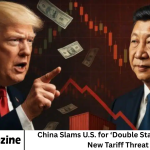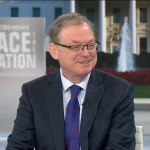France, a nation celebrated for its rich democratic heritage, is once again caught in the throes of political unrest. The political landscape has grown increasingly volatile following a series of government struggles, street protests, and mounting polarization between the left and right.
- The Growing Political Unrest in France
- Macron’s Remarks: Blaming Rivals for ‘Disorder’
- The Roots of the Crisis: From Pension Reform to Political Fragmentation
- Economic and Social Factors Fueling Discontent
- France’s Political Spectrum: Polarization at Its Peak
- Public Reaction: Anger, Protests, and Polarization
- Europe Watches Closely: The EU Dimension
- Macron’s Next Moves: Reclaiming Control
- The Broader Implications for French Democracy
- The Role of the Opposition: Responsibility or Opportunism?
- Possible Scenarios Ahead
- Frequently Asked Question
- Conclusion
French President Emmanuel Macron, facing intense scrutiny from both opposition parties and the public, has shifted blame toward his political rivals for what he describes as a growing “sense of disorder” in the country.
The president’s leadership and his centrist approach are under greater pressure than ever before. This article delves into the unfolding French political crisis, Macron’s response, and the broader implications for France and Europe.
More Read: Rising Shutdown Fears Boost Safe-Haven Appeal of Gold and Silver
The Growing Political Unrest in France
Over the past few months, France has experienced escalating political instability marked by mass demonstrations, legislative deadlock, and intensifying party rivalries. The immediate backdrop to this turmoil lies in Macron’s attempts to push through controversial reforms.
Particularly on issues such as pensions, immigration, and public spending—that have provoked fierce resistance across the political spectrum. The French president, who came to power in 2017 as a centrist reformer promising to unite a divided nation.
Now finds himself surrounded by political adversaries who accuse him of elitism and authoritarian tendencies. His once-commanding parliamentary majority has eroded, forcing his government to rely on fragile alliances and decrees to pass key legislation.
Meanwhile, opposition parties—from the far-left France Insoumise led by Jean-Luc Mélenchon to the far-right National Rally under Marine Le Pen—are capitalizing on public frustration. Both factions have used the current climate to portray Macron as detached from the everyday struggles of French citizens.
Macron’s Remarks: Blaming Rivals for ‘Disorder’
In a recent public statement, President Emmanuel Macron openly blamed his political opponents for fueling a “sense of disorder” and undermining national unity. He accused rival parties of exploiting public anger for political gain, rather than contributing constructively to governance.
“Some prefer chaos over responsibility,” Macron said in a televised address. “Instead of helping France move forward, they thrive on division and obstruction.”
His remarks came after several high-profile political clashes in parliament, where opposition lawmakers blocked or delayed government proposals. The president’s tone reflected frustration at what he perceives as deliberate sabotage of his reform agenda.
A sentiment echoed by several ministers within his administration. However, critics argue that Macron’s accusations are a deflection from his own missteps. They claim his leadership style—often described as top-down and technocratic—has alienated voters and eroded trust in government institutions.
The Roots of the Crisis: From Pension Reform to Political Fragmentation
The roots of France’s current political turmoil run deep. The most immediate spark came from Macron’s decision to overhaul the national pension system, a reform he deemed necessary to ensure long-term sustainability.
The proposal, which included raising the retirement age from 62 to 64, triggered nationwide strikes and protests. Labor unions, opposition parties, and large swaths of the working class viewed the reform as an attack on social welfare—a cornerstone of France’s identity.
When Macron’s government used a constitutional provision (Article 49.3) to push the law through parliament without a direct vote, outrage spread across the nation. This episode severely damaged Macron’s reputation as a democratic leader.
Adding to the turmoil, the French National Assembly has become increasingly fragmented. Macron’s centrist alliance, once dominant, now faces an emboldened opposition on both extremes. The result is legislative paralysis—where every bill becomes a battlefield, and consensus seems elusive.
Economic and Social Factors Fueling Discontent
Beyond politics, France’s economic landscape has contributed significantly to the unrest. Rising inflation, stagnant wages, and mounting public debt have deepened public dissatisfaction. Many citizens believe that Macron’s economic policies disproportionately favor the wealthy, reinforcing his image as the “president of the rich.”
Moreover, persistent issues such as unemployment, housing shortages, and social inequality continue to plague everyday life. For many working-class and rural voters, these struggles are emblematic of a political elite disconnected from their realities.
The tension is also cultural. Immigration and national identity debates have sharpened divisions, with the far-right exploiting concerns about security and integration. Meanwhile, left-wing activists accuse Macron of drifting too far toward neoliberalism, betraying France’s social democratic traditions.
France’s Political Spectrum: Polarization at Its Peak
The polarization in French politics today is unlike anything seen in decades. The center has weakened, while the far ends of the spectrum have grown stronger.
- On the Left: Jean-Luc Mélenchon’s France Insoumise continues to mobilize massive street protests, accusing Macron of dismantling workers’ rights and public services. His rhetoric portrays the president as an authoritarian figure undermining democracy.
- On the Right: Marine Le Pen’s National Rally has surged in popularity by tapping into anti-immigrant sentiment and economic frustration. Polls show her party gaining ground ahead of the next presidential and parliamentary elections.
- In the Center: Macron’s Renaissance party faces the difficult task of governing amid this polarization, attempting to bridge ideological gaps that seem wider than ever.
Political analysts warn that this growing divide could destabilize not only the government but also France’s broader democratic fabric. With each side refusing to compromise, governance risks grinding to a halt.
Public Reaction: Anger, Protests, and Polarization
Public frustration is palpable across France’s major cities. Protests have become a near-weekly occurrence, often marked by clashes between demonstrators and police. From Paris to Marseille, banners denouncing “Macron’s arrogance” and calls for his resignation echo through the streets.
The protests are no longer limited to pension reforms—they now reflect a broader disillusionment with the political establishment. Many citizens express fatigue with the constant turmoil and distrust in politicians from all parties.
Social media platforms have amplified the anger, with viral videos of police crackdowns fueling further outrage. Civil rights groups have criticized the government’s handling of demonstrations, accusing it of heavy-handed tactics.
The atmosphere of confrontation has reached even local councils and universities, where debates about democracy and governance have turned increasingly heated.
Europe Watches Closely: The EU Dimension
France’s political instability carries significant implications for the European Union. As one of the EU’s most influential members, France plays a central role in shaping economic and defense policies.
European leaders have expressed concern over France’s internal divisions, fearing they could weaken EU unity at a time when Europe faces challenges from economic uncertainty, climate policy transitions, and global geopolitical tensions.
Macron, known for his strong pro-EU stance, has been a key advocate for European integration and defense cooperation. However, domestic turmoil limits his ability to push ambitious initiatives at the European level.
If the French crisis deepens, it could embolden Eurosceptic movements across the continent, potentially undermining confidence in EU leadership and cohesion.
Macron’s Next Moves: Reclaiming Control
Despite the growing unrest, President Macron remains defiant. He insists that his government will stay the course and continue implementing reforms necessary for France’s long-term stability.
The president has recently initiated a series of consultations with regional leaders, business representatives, and unions in an attempt to restore dialogue. Analysts suggest that Macron’s strategy now hinges on two main goals:
- Restoring public trust through social dialogue and visible economic measures.
- Strengthening the government’s legislative position by seeking pragmatic alliances within parliament.
However, with the opposition showing little willingness to cooperate, Macron’s ability to govern effectively may depend on how well he can communicate his vision to a weary public.
The Broader Implications for French Democracy
France’s ongoing crisis is not merely a political dispute—it represents a test of the country’s democratic resilience.
The growing sense of alienation among citizens, the erosion of parliamentary trust, and the rise of populist movements point to a deeper institutional malaise. Many observers warn that France could be entering a new phase of democratic instability if meaningful reforms and dialogue do not occur soon.
At the same time, the crisis may also serve as a wake-up call for French political culture. Calls for a more participatory and transparent democracy are growing louder, with civil society movements demanding reforms in representation and governance.
Whether Macron can navigate this turning point will likely define his legacy—and the future trajectory of France’s Fifth Republic.
The Role of the Opposition: Responsibility or Opportunism?
Macron’s criticism of his opponents raises a crucial question: are France’s opposition parties acting responsibly in a time of crisis?
While it is natural for political adversaries to challenge the ruling government, analysts argue that the current climate of relentless confrontation has made constructive policymaking nearly impossible.
Mélenchon’s leftist bloc often stages walkouts or disruptions in parliament, while Le Pen’s far-right movement focuses on mobilizing discontent rather than proposing detailed legislative alternatives.
This political theater, though effective in stirring public sentiment, risks further alienating voters from democratic institutions. A growing portion of the French electorate believes that none of the major parties—neither Macron’s centrists nor his rivals—represent their interests adequately.
Possible Scenarios Ahead
France now stands at a crossroads, and several scenarios could unfold in the coming months:
- Stabilization through dialogue: Macron successfully reopens dialogue with unions and moderates, easing tensions and restoring some legislative functionality.
- Escalation of protests: Continued government inaction and unpopular reforms trigger another wave of mass protests, potentially leading to civil unrest.
- Political realignment: Emerging parties or movements reshape the French political map, breaking the traditional left-right dichotomy.
- Early elections: If gridlock persists, Macron may be forced to call snap parliamentary elections—a high-risk move that could strengthen the opposition.
Each of these outcomes carries profound consequences not just for France, but for Europe’s broader political equilibrium.
Frequently Asked Question
What triggered the latest political crisis in France?
The current crisis stems primarily from President Macron’s pension reform, which raised the retirement age from 62 to 64. The government’s decision to force the reform through parliament without a direct vote fueled widespread protests and political backlash.
Why is Macron blaming his rivals for the “sense of disorder”?
Macron accuses opposition parties of deliberately obstructing government policies and exploiting public anger to weaken his administration. He argues that such tactics undermine democracy and contribute to national instability.
How are French citizens reacting to the turmoil?
Public frustration is high. Large-scale protests, strikes, and demonstrations have erupted across the country. Many citizens feel disconnected from political elites and disillusioned with the government’s handling of reforms.
Which political figures are leading the opposition?
The main opposition comes from Jean-Luc Mélenchon of the far-left France Insoumise and Marine Le Pen of the far-right National Rally. Both have gained significant momentum by capitalizing on public dissatisfaction with Macron’s policies.
What are the economic factors behind the unrest?
Rising living costs, inflation, unemployment, and economic inequality have deepened public anger. Many believe that Macron’s policies benefit corporations and the wealthy while neglecting working-class concerns.
How does this crisis affect the European Union?
As a leading EU member, France’s instability has implications for European unity. Macron’s domestic troubles limit his influence in Brussels and weaken Europe’s collective ability to respond to economic and geopolitical challenges.
What could happen next in French politics?
Possible scenarios include renewed dialogue and stabilization, escalation of protests, a reshaped political landscape through new movements, or even early parliamentary elections if the government remains gridlocked.
Conclusion
As France’s political turmoil deepens, President Emmanuel Macron finds himself navigating one of the most challenging moments of his presidency. His decision to blame rivals for the “sense of disorder” reflects both frustration and strategic calculation—an attempt to reframe the narrative in his favor.
However, the underlying causes of unrest extend far beyond partisan rivalry. Deep-seated economic, social, and institutional challenges continue to erode confidence in government and democracy itself.







